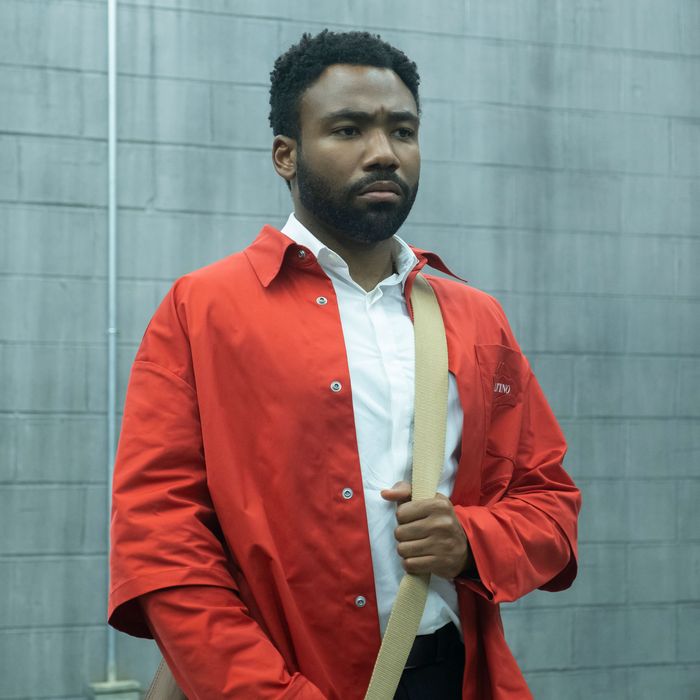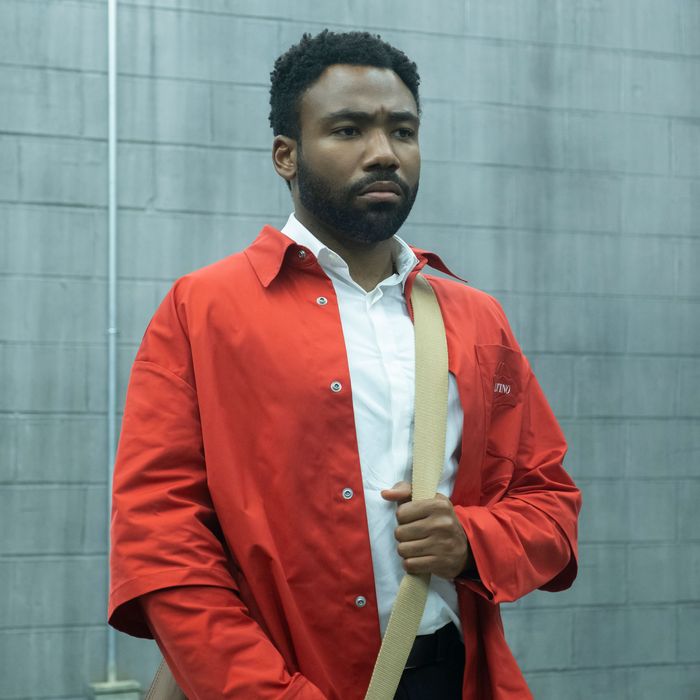
Atlanta
Born 2 Die
Season 4 Episode 3
Editor’s Rating
Photo: FX
In last season’s “New Jazz,” Al is confronted by a guardian angel of sorts in the form of Lorraine, a fabulously snarky young woman with the same name as his mother. As Lorraine leads Al through Amsterdam as he’s tripping on space cake, her line of questioning makes him ponder his status as a Black rap artist. The title of the episode is an obvious nod to the fact that rap has become the new jazz — almost identically mirroring each other in terms of popularity, racial origins, and the eventual unfair commodification of the art form. Black musicians of the Jazz Age were often exploited by white music executives who knew how popular, and lucrative, Black music was becoming. Blues singer of the 1920s Big Bill Broonzy once said, “I didn’t get no royalties, because I didn’t know nothing about trying to demand for no money, see?”
I consider tonight’s Atlanta to be a continuation of “New Jazz” and its themes of control, power, and who ultimately “owns” the culture, especially since that episode ended with Al finding out that Earn had negotiated full ownership of Paper Boi’s masters when signing the record deal. Although now, in season four, Al is making a significant amount of money on the heels of his tour and has the security of owning his music catalog, he begins to realize that there may be a limit to his current success after meeting fellow rappers in the same predicament. Following a performance at a bar mitzvah, the father of aspiring white rapper Benny approaches Al and asks if he can teach his son how to be a rapper. He asks Al how he makes his expressions and demeanor “real.” Al is dismissive of the offer until the father offers him $1 million to work with his son in the studio.
When Al arrives at the studio, at first it seems like the typical “rich white kids desperate for culture” situation: There’s a white boy yodeling over trap beats and a song recorded by Lil Rick called “The Ricky Rock” featuring verses like “I’m ricking, I’m rocking, I’m ticking, I’m tocking.” Lil Rick’s manager, Bunk, joins him in the studio and asks Al if he wants to slip away for a real conversation. They talk shit about the young boys they’re helping, then Bunk tells Al he should be making $10 million instead of $1 million. He invites Al to an upcoming meeting with like-minded people in the same position, which begins with one of the leaders saying, “If you’re in here, that means you care about your future.” He goes into a spiel about how rapping alone doesn’t make you real money — the type of money that separates rich people from the wealthy, that is. He talks about how rap is all about optics, meaning white people will continue to be more profitable. He then proposes a system of acquiring and mentoring YWAs (young white avatars) like the kids Al was with at the studio. The goal? Get these kids a Grammy and get yourself some coin.
Al rejects the idea of having to rely on a YWA to maintain his wealth, arguing he could just make another album himself and use the clout to go on tour again. Bunk shuts down this argument, saying, “Nobody wants to hear you … because you’re old. You can never get bigger than your last album.” They go on to show him a slideshow of the three stages of the rap game — going from street rapper to OG to someone who acts in family films. Bunk tells him there’s not much more space for Paper Boi to grow now that he has hit the stardom required for arena tours. He’s right. There are only so many Jay-Zs in a generation. The prophecy is already writing itself because, as Bunk points out, the kids in the studio didn’t have any idea who Paper Boi was. Unconvinced, Al says people fuck with him because he speaks for the streets, to which the meeting leader replies, “The streets can’t feed you. Do you want to end up like Blue Blood? I loved that nigga, and I didn’t even know he had an album out until he was in the ground for five months.”
Season three recapper Jordan Taliha McDonald beautifully compared Al’s high journey during “New Jazz” to a dance called the cakewalk that originated on plantations as a contest between enslaved people judged by their enslavers. McDonald included this quote from Amiri Baraka: “If the cakewalk is a Negro dance caricaturing certain white customs, what is that dance when, say, a white theater company attempts to satirize it as a Negro dance?” That quote stayed in my head throughout this episode; I kept thinking about how a lot of rap culture has become Black rappers caricaturing certain white customs (obscene wealth, capitalism, gun violence, etc.), but the rise in white people appropriating hip-hop aesthetics creates this odd circular situation of white people acting like Black people who desperately want the power white people have. Atlanta, doing what it does best, takes it a step further and subverts the stereotype of white executives exploiting Black artists.
Al goes on to try and sign Benny as a client, pulling up at one of his high-school performances. However, it turns out that Bunk had already swooped Benny, adding him to his clientele before Al could. Yodel Kid from the studio is at the performance, ridiculously high on percs, and Al ends up giving him a ride home. Fast-forward to Grammy season, when we see Al attending a party along with Bunk and some other YWA managers. Bunk asks Al if he’s nominated for anything, but Al reveals that it’s not Paper Boi who is nominated but his new client: Yodel Kid. With Al’s help, the wannabe trap yodeler went platinum in three weeks. Unable to get ahold of Yodel Kid, Al asks Benny if he has seen his friend, and Benny informs him of the unfortunate news of Yodel Kid’s fatal overdose. But according to Benny, the good news is that he’ll probably win the Grammy. And of course, he does.
In a separate story line, Earn goes on a mission to sign R&B singer D’Angelo to the managing firm he works for. He decides to do this after his boss demands an “all hands on deck” emergency to help provide damage control for an author who is caught on Ring footage pulling a gun on a Black teen trying to fundraise. Earn says he’d rather sign a new artist than help rebrand the racist author. He texts someone who possibly knows D’Angelo’s hair braider and is directed to a Rally’s. The bathrooms at the fast-food chain have one door labeled “Employees only” and the other labeled “D’Angelo.” On the other side of the D’Angelo door, there’s a cement room eerily reminiscent of a jail cell with a cot on the floor covering a blood stain, chalk tallies on the wall, and a man sitting guard in front of an ornate door. Earn decides to sit in the room and wait for D’Angelo. Days pass, but he remains determined, passing the time by writing on the walls in chalk, reading, and throwing a ball against the wall. When Earn asks for water, the guard points to a random cabinet that contains a lone pack of Dasani. Yes, Dasani. (Being expected to drink Dasani water after days of captivity is cruel and unusual punishment, and I won’t be explaining any further.)
The Dasani (rightfully) evokes an outburst from Earn, who yells, “Where is D’Angelo? Can I please see D’Angelo?” He sits back down and says, “What is D’Angelo? We are D’Angelo. Let me experience D’Angelo.” Apparently, these are the magic words, as the still-silent guard opens the door revealing a tunnel that leads to an apartment with a man making a sandwich while listening to Al Green claiming to be, you guessed it, D’Angelo. Well, not exactly D’Angelo but the “experience” of D’Angelo, claiming people aren’t worthy of the real singer. The man says that D’Angelo is really just a “complex network of men, women, and D’Angelos spread across countries” and that Earn has proven himself worthy, then wipes some of the peanut butter from his sandwich across Earn’s forehead. “D’Angelo” reminds Earn about a dream he says Earn had when he was 8 where he’s swimming and below the water are hands grasping to reach him, but he fights to keep them from pulling him under. He asks, “Why are you so certain the hands intend to harm you?” Other than this thought resonating with my anxiety and inability to ask or receive help, the entire scene is nonsensical — like the best scenes in Atlanta are.
I’m not sure whether the D’Angelo scene is meant to make us wonder what Black music is if not a shared experience with a few chosen figureheads leading the way, a metaphor for the cult of celebrity worship and the hoops we jump through for superstars, or perhaps something else entirely. But I’m looking forward to hearing different theories from viewers. This is the Atlanta I missed last season, the Atlanta that would make me think for days and become an active participant in the art even when it made me uncomfortable or confused. Because, like Earn said, “It’s not about what feels good. It’s about what survives.”
• During the YWA meeting, a fellow attendee offers Al a plate of Oreo cookies. Instead of the traditional Oreo, these have one chocolate cookie and one vanilla cookie sandwiching the cream. They reminded me of my ruminations surrounding Baraka’s cakewalk quote and how Black culture and white culture both clash and intertwine.
• Benny referring to Al as the guy his dad “bought” gave me a good laugh. The irony of such terminology coupled with the way his father approached Al in the first place is a reminder that, in many ways, white people still see Blackness as a commodity and not a culture birthed from real human beings.
• One of my favorite past Atlanta episodes is one that revealed that Justin Bieber is Black. In tonight’s episode, Chief Keef is still an established rapper like he is in real life, but in the show, he has ventured into Ice Cube territory by acting in family movies. I would love to see Chief Keef opposite maybe Nicole Beharie in a movie about a rapper turned family man.

